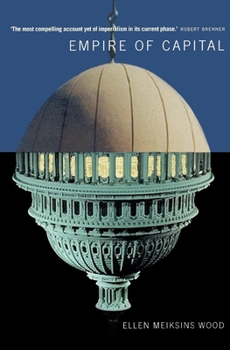Empire of Capital
Select Format
Select Condition 
Book Overview
Capitalism makes possible a new form of domination by purely economic means, argues Ellen Meiksins Wood. So, surely, even the most seasoned White House hawk would prefer to exercise global hegemony in... This description may be from another edition of this product.
Format:Paperback
Language:English
ISBN:1844675181
ISBN13:9781844675180
Release Date:January 2005
Publisher:Verso
Length:200 Pages
Weight:0.55 lbs.
Dimensions:0.5" x 5.3" x 7.7"
Customer Reviews
3 ratings
Timely Response
Published by Thriftbooks.com User , 20 years ago
To quote from p. 5 of the book: " The argument here is not that of capital in conditions of `globalization' has escaped the control of the state and made the territorial state increasingly irrelevant. On the contrary, my argument is that the state is more essential than ever to capital, even, or especially, in its global form. The political form of globalization is not a global state but a system of multiple states, and the new imperialism takes its specific shape from the complex and contradictory relationship between capital's expansive economic power and the more limited reach of the extra-economic force that sustains it." In a nutshell, this is the book's thesis, and it addresses the timely question of what form globalization will ultimately take. Against the de-centered, monolithically global state of the sort detailed in Hardt & Negri's fashionable work *Empire*, Wood argues that the only possible outcome is a multi-state system, presumably like the one already in place. For that reason alone her book is worth the read, given the wide popularity of H & N's thesis. Of the two perspectives, Wood's is certainly on firmer empirical ground. As currently experienced, globalization is very much a product of a multi-state system, led by American capital and the state's capacity to maintain financial and military hegemony. (In fact, much of current middle-east policy can be understood from that strategic standpoint.) On the other hand, H & N's fluid leviathan appears more visionary than contemporary, more theoretical than factual, and more the result of shrewd extrapolation and darkly compelling fantasy than of historical necessity. Nonetheless, Wood at times goes too far in her insistance on a multi-state alternative. "Yet global capitalism without a system of multiple territorial statesis all but inconceivable." (p.24). Now whatever the shortcomings of Hardt & Negri's book, it appears that despite Wood's assertion, this is precisely what H & N succeed in conceptualizing. Their deterritorialized empire is predicated precisely on the rise of a complex, etherialized framework of international capitalist controls, supra-national in scope and monolithic in nature. In short, it is the emergence of a single, invisible empire of capital, beyond the confines of nation-state, and operating on post-modern cultural and political trends. It's possible to argue the likelihood of this scenario or, given the contradictions of capital, how long it could last, but as an alternative to a multi-state system, it is scarcely inconceivable. Overall, Wood's slender volume remains deceptively accessible, with none of the heavy weather of Hardt & Negri, and, despite the thematic association, is quite useful apart from the latter. Her brief history of imperialism is informative, with a revealing emphasis on Locke, and I especially like her observations on the role of corporations in the modern world of capital; anti-corporate activists should take hee
Amazing book
Published by Thriftbooks.com User , 21 years ago
This is a wonderful book that deserves to be read widely. It works its way through the history of empires and seeks to establish what is distinctive about the present 'Empire of Capital'. For Wood, the current form of imperialism is not simply a new US imperialism, but she manages in a glorious way to show the contradictions that result from the universalization of capitalism (which creates a new type of world market imperialism) on the one hand, and the pursuit of global domination by the US on the other. This book, grounded in real historical understanding, offers so much more if you want to understand the nature of the present than the currently popular discussions of empire and imperialism by ideologues like Max Boot, Niall Ferguson and Robert Kagan.
Useful, interesting Marxist history of imperialism
Published by Thriftbooks.com User , 21 years ago
Wood is one of a rare breed--a jargon-free Marxist academic. In this short, thoughtful book, she discusses the political and economic basis of "empire" through history. The point is, of course, to better understand the nature of 21st century American imperialism. She achieves that goal. One word of caution--an understanding of Marxism, if not an acceptance of it, is probably a necessary starting point.






